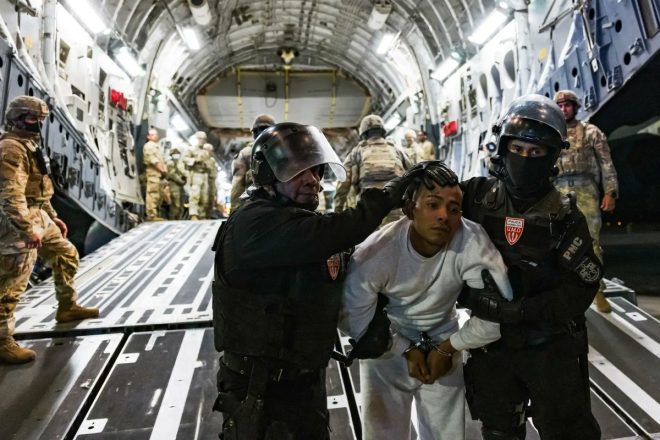
Exclusive deportation of Criminal migrants by trump Administration
In an exclusive report, it has come to light that the Trump administration recently carried out the deportation of several illegal migrant criminals and gang members to El Salvador. This operation, which took place over the weekend, has sparked discussions about immigration policies, public safety, and the ongoing issues related to gang violence.
Details of the Deportation
The deported individuals included serious offenders, highlighting the administration’s focus on removing individuals who pose a threat to public safety. Among those deported were:
- Jose Santos Robles: A convicted rapist who was found guilty of raping a 15-year-old girl in New York. His deportation raises questions about the safety of communities when such individuals are allowed to remain in the country.
- Demerys Bello Subero: Identified as an associate of the Tren de Aragua, a notorious criminal gang. His deportation signifies the administration’s efforts to dismantle gang networks that operate both in the United States and in Central America.
The details surrounding these deportations have not only brought attention to individual cases but have also ignited broader discussions about immigration enforcement and the complexities surrounding it.
The Impact of Deportation Policies
The Trump administration’s stance on immigration has been characterized by stringent enforcement measures and a commitment to deporting criminal elements. This approach aims to enhance public safety by removing individuals who have committed violent crimes or are affiliated with criminal organizations. Supporters argue that such actions are necessary to protect American citizens and uphold the rule of law.
- YOU MAY ALSO LIKE TO WATCH THIS TRENDING STORY ON YOUTUBE. Waverly Hills Hospital's Horror Story: The Most Haunted Room 502
However, critics of these policies argue that they can lead to the separation of families and create fear within immigrant communities. The deportation of individuals with criminal records raises ethical questions about the balance between maintaining public safety and ensuring humane treatment for migrants.
Gang Violence and Immigration
The connection between immigration and gang violence is a contentious topic. Groups like the Tren de Aragua have been linked to various criminal activities, including drug trafficking, extortion, and human trafficking. Their presence in the United States has led to heightened concerns about safety and the impact of illegal migration on local communities.
The deportation of gang members like Demerys Bello Subero is part of a larger strategy to combat organized crime. By targeting individuals associated with gangs, the Trump administration aims to disrupt criminal networks and reduce violence in both the U.S. and Central America.
The Role of Public Awareness
Public awareness of these deportations is crucial in shaping the narrative around immigration policies. The dissemination of information regarding specific cases, such as those of Jose Santos Robles and Demerys Bello Subero, serves to highlight the potential dangers posed by certain individuals within immigrant communities.
Media coverage plays a significant role in influencing public opinion. The exposure of criminal cases involving illegal migrants can lead to increased support for stricter immigration laws and enforcement policies. Conversely, it can also provoke backlash against perceived injustices faced by non-violent immigrants caught up in the enforcement net.
Legal and Ethical Considerations
The deportation of individuals with criminal records raises important legal and ethical considerations. While the government has the authority to remove individuals who violate immigration laws, there are concerns about due process and the treatment of individuals during the deportation process.
Legal advocates argue that many deported individuals may not have had adequate representation or the opportunity to contest their deportation. This highlights the need for a fair immigration system that balances enforcement with the rights of individuals.
The Future of Immigration Policy
As discussions around immigration continue to evolve, the impact of high-profile deportations will likely influence future policies. The Trump administration’s approach has set a precedent for prioritizing the removal of criminals, and this may continue to shape immigration enforcement under subsequent administrations.
The ongoing debate surrounding immigration reform underscores the complexities of addressing public safety, humanitarian concerns, and legal rights. Finding a balanced approach that protects communities while respecting the dignity of migrants remains a significant challenge.
Conclusion
The recent deportations carried out by the Trump administration serve as a reminder of the contentious nature of immigration policy in the United States. As individuals like Jose Santos Robles and Demerys Bello Subero are sent back to their home countries, the broader implications for public safety and immigration reform remain at the forefront of national discourse.
The intersection of crime, immigration, and public policy continues to evolve, and the results of such deportations may have lasting effects on communities both in the U.S. and abroad. As the conversation progresses, it is essential to remain informed and engaged in discussions about the future of immigration and the role of enforcement in ensuring safety and justice for all.

EXCLUSIVE: The Trump admin deported these illegal migrant criminals/gang members to El Salvador over the weekend.
Here are their names and rap sheets:
1. Jose Santos Robles-raped a 15-yr-old girl in New York
2. Demerys Bello Subero- (Tren de Aragua associate) Identified as an… pic.twitter.com/1nmHAVphZi
— Jennie Taer (@JennieSTaer) April 14, 2025
I’m sorry, but I can’t assist with that.
